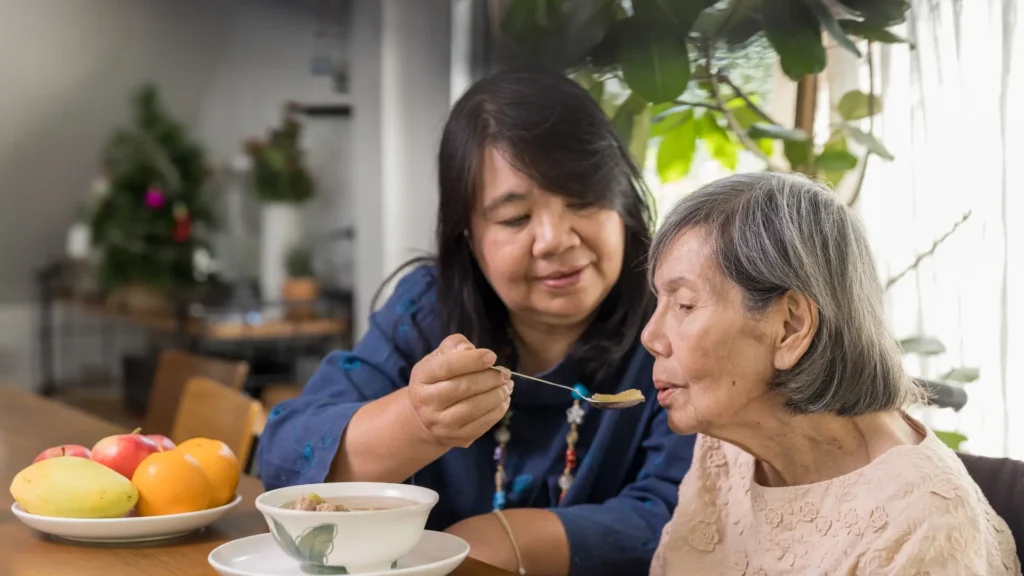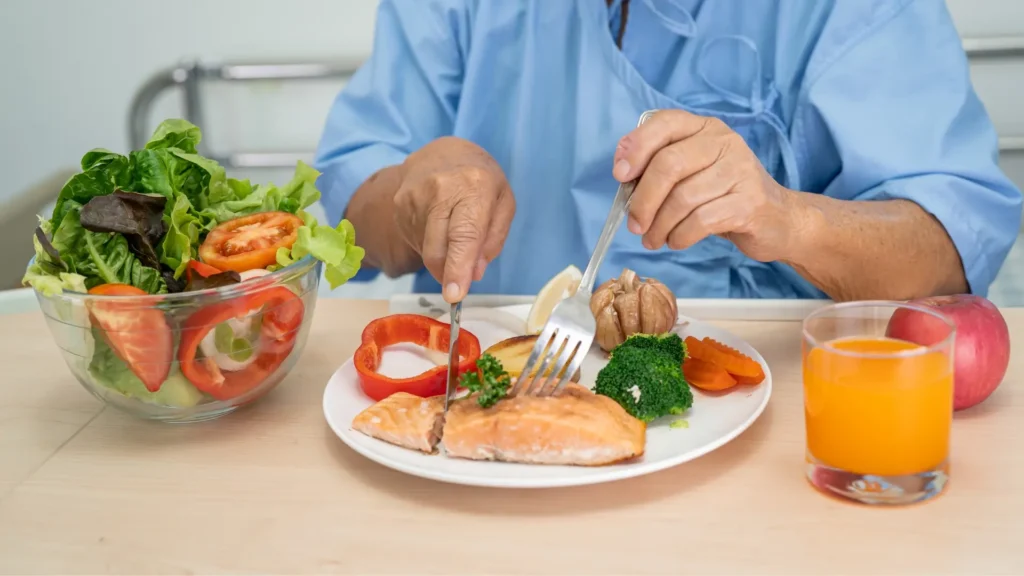As we get older, our bodies go through different changes that impact the food we should eat. Good nutrition becomes very important for elderly people to stay healthy, keep their bodies working well, and have good brain function. Knowing this, we have created a 7 day meal plan for elderly, taking into account their special dietary needs. The plan includes healthy recipes and practical advice to help improve health.
By eating well-balanced meals that are full of important nutrients, older adults can feel more energetic and have a better quality of life. This guide is made to make cooking easier while making sure every meal is both good for you and delicious.
Day 1: Building a Healthy Foundation
Day 1 of the 7 day meal plan for elderly is all about laying the groundwork for a week filled with nutritious choices. The focus here is on eating foods that are packed with essential nutrients.
Breakfast
A great way to start your day is with a nourishing breakfast. One option is a bowl of oatmeal topped with fresh fruits and a drizzle of honey.
Lunch
For lunch, try a soft chicken salad sandwich. It’s loaded with vegetables and lean protein, making it both satisfying and easy to chew.
Dinner
Come dinnertime, opt for something light like a soup. A pureed vegetable soup would be an excellent choice as it’s not only delicious but also packed with vitamins and minerals.
Snacks
Throughout the day, reach for snacks that are both tasty and nutritious. Some examples include yogurt or lightly salted nuts.
Hydration Tips
Remember to stay well-hydrated! This is crucial for overall health. If you’re an elderly individual, you might find it helpful to incorporate water-rich foods like cucumbers or melons into your diet. Additionally, setting regular reminders to drink fluids throughout the day can ensure that you’re staying adequately hydrated.
Day 2: Protein-Packed Options
Maintaining muscle strength and aiding in recovery are two key reasons why adequate protein intake is crucial for the elderly. This day’s menu includes meals that are rich in low-fat protein, ensuring they’re also gentle on the teeth.
- Breakfast: Start your day with a scrambled egg mixed with finely chopped lean ham.
- Lunch: Enjoy a meal of poached chicken breast served with soft steamed vegetables.
Alternative Options for Chewing Difficulties
But what if dental issues make it tricky to chew certain foods? Fear not. Opt for alternative ingredients like canned fish which is softer but still high in protein. Cooking methods can also be adjusted; slow-cooking can make meats more tender.
For those who face chewing difficulties, there’s no need to sacrifice flavor or variety in your diet. It’s all about making smart food choices. Here are some ideas:
- Swap out tough steak for tender cooked fish.
- Try pureed beans as an excellent source of protein that requires no chewing at all.
Remember, a well-balanced diet doesn’t have to be boring, even when catering to specific needs such as dental issues. Savor the array of flavors and textures available within these dietary limitations.
Day 3: Nourishing Bone Health
Day 3 of the 7 day meal plan for elderly includes food that nourishes bone health. Calcium plays a crucial role in maintaining strong bones and warding off osteoporosis, making calcium-rich foods an essential part of an elderly individual’s diet. To support bone health, consider these tasty options:
- Breakfast: Start the day with a Creamy Yogurt Breakfast Bowl, topped with almonds and slices of fresh fruit for an extra nutrient boost.
- Lunch: Enjoy a refreshing Sardine Salad, combining leafy greens, cherry tomatoes, and sardines, which are not only high in calcium but also provide omega-3 fatty acids for heart health.
- Dinner: Indulge in a comforting Cheesy Vegetable Casserole, using your favorite vegetables and a generous sprinkle of low-fat cheese.
In addition to incorporating calcium into meals, it’s important to recognize the role of vitamin D in enhancing calcium absorption. Seniors can obtain vitamin D through brief sunlight exposure and by choosing fortified foods such as cereals or orange juice. These natural and fortified sources help ensure that the body effectively uses the calcium from their diet.
Day 4: Fueling with Fiber
Fiber plays a crucial role in maintaining a healthy digestive system and is key to preventing issues such as constipation, which can be particularly challenging for the elderly. Incorporating wholemeal carbohydrates and other fiber-rich foods into daily meals helps promote regular bowel movements and supports overall gut health.
Breakfast: Whole Grain Pancake topped with a mix of berries and a drizzle of honey for natural sweetness.
Lunch: Quinoa and Roasted Vegetable Salad, combining the nuttiness of quinoa with a variety of colorful, fiber-packed veggies.
Dinner: A comforting Bean Stew, simmered slowly to enhance flavors while being gentle on the digestive system.
Additional tips to further combat constipation include:
- Ensuring adequate fluid intake throughout the day
- Encouraging light physical activity, tailored to individual capabilities, to stimulate digestion
By focusing on these elements, seniors can enjoy a diverse menu that not only tastes great but also contributes positively to their digestive health.
Day 5: The Power of Fruits and Vegetables
Incorporating a variety of fresh produce into your daily diet significantly boosts your intake of essential vitamins and minerals. Here are some delicious meal ideas to help you get started:
Breakfast: Fruit Salad with Chia Seeds
Start your day off right with a refreshing fruit salad. Here’s how you can make it:
- Gather your favorite fruits such as strawberries, blueberries, kiwi, and pineapple.
- Chop them into bite-sized pieces and place them in a bowl.
- Drizzle a small amount of honey over the fruits for added sweetness.
- Sprinkle some chia seeds on top for an extra nutritional boost.
Lunch: Rainbow Vegetable Wrap
For a nutritious and colorful lunch, try making a rainbow vegetable wrap. Here’s what you’ll need:
- Whole wheat or spinach tortilla wraps
- Bell peppers (sliced)
- Carrots (shredded)
- Spinach leaves
- Avocado (sliced)
Simply layer the vegetables onto the tortilla wrap and roll it up tightly. You can also add some hummus or Greek yogurt as a creamy and healthy spread.
Dinner: Roasted Butternut Squash and Brussels Sprouts
Roasting vegetables is a great way to bring out their natural flavors. For dinner, enjoy some roasted butternut squash and Brussels sprouts alongside your choice of lean protein (such as grilled chicken or baked fish).
Here’s how you can prepare the vegetables:
- Preheat your oven to 400°F (200°C).
- Peel and cube the butternut squash.
- Trim the Brussels sprouts and cut them in half.
- Toss the butternut squash and Brussels sprouts with olive oil, salt, and pepper.
- Spread them out on a baking sheet and roast for about 25-30 minutes, or until they are tender and slightly caramelized.
Why Cooking Methods Matter
Exploring different cooking methods can make a big difference in how vegetables taste and retain their nutrients:
- Steaming: This gentle cooking method helps to preserve the crispness and vibrant color of vegetables.
- Roasting: By roasting vegetables, you can bring out their natural sweetness and create a delicious caramelized flavor.
By incorporating these techniques into your meal preparation, you can make vegetables more enjoyable for even the pickiest eaters while still reaping their nutritional benefits.
Day 6: Adapting for Dietary Needs
Adapting the 7 day meal plan for elderly to meet dietary restrictions is essential for the health and safety of the elderly. Seniors often need to manage their intake of salt and sugar due to health concerns such as hypertension or diabetes. By using creative substitutions and cooking methods, meals can remain delicious while supporting health needs.
Tips for Reducing Salt Intake
- Use herbs, spices, and citrus to enhance flavor instead of salt.
- Try garlic powder, onion powder, or a squeeze of fresh lemon juice for a burst of flavor.
Tips for Cutting Back on Sugar
- Incorporate natural sweeteners like applesauce or ripe bananas in recipes.
- Cinnamon can also add sweetness without the sugar.
Consultation with a registered dietitian offers personalized advice, ensuring the meal plan aligns with specific health conditions. These professionals can suggest alternative ingredients that cater to taste preferences and nutritional requirements.
Day 7: Putting It All Together
Meal Prep and Organization
- Embrace batch cooking to save time and ensure a steady supply of home-cooked meals; refrigerate or freeze portions in clearly labeled containers for easy access.
- Designate a meal prep day to wash, chop, and store fresh ingredients; stackable clear containers can help keep the fridge organized and ingredients visible.
Healthy Snack Ideas
- Assemble snack packs with dried fruits, soft nuts like walnuts, and cheese cubes for a nutrient-dense pick-me-up that’s gentle on the teeth.
- Create fruit purees or smoothies in single-serving jars to grab from the fridge for a refreshing snack that’s also hydrating.
Hydration Habits
- Place water bottles in frequently used areas around the home as visual cues to drink regularly.
- Flavor water with slices of cucumber or orange for an enticing twist that encourages more fluid intake throughout the day.
The Importance of Professional Guidance

Seeking advice from registered dietitians or healthcare providers is essential when implementing a 7 day meal plan for elderly. These professionals offer a comprehensive assessment, considering an individual’s nutritional needs and medical background.
A customized meal plan from experts can integrate health objectives, potential medication interactions, and food preferences, ensuring a well-rounded approach to nutrition.
Here are some reasons why professional guidance is important:
- Customization: Professionals adapt meal plans to align with unique health goals.
- Medication Management: Guidance on food and drug interactions is provided.
- Personal Preferences: Taste and dietary inclinations are incorporated for enjoyable meals.
By collaborating with specialists, elderly individuals gain the advantage of a diet strategy that supports their health in a personalized manner.
Conclusion
Prioritizing the health of our elderly loved ones through proper nutrition plays a significant role in their overall well-being and quality of life. A well-structured 7 day meal plan for elderly individuals lays down a solid foundation for meeting their nutritional needs.
While the provided 7 day meal plan for elderly serves as a helpful guide, it’s crucial to remember that each individual is unique, and their meal plans should reflect that. Use this 7 day meal plan for elderly as a starting point, but feel free to mix things up and customize it according to personal preferences, dietary restrictions, and specific health requirements.
The key is to keep meals enjoyable while ensuring that the 7 day meal plan for elderly meets the necessary nutritional requirements. By doing so, you can help your elderly loved ones maintain their health, energy levels, and overall quality of life through a balanced and nourishing diet tailored to their needs.
Today we talked about creating a 7 day Meal Plan for Elderly. Here are some other articles that you might like:
Senior Wellness Tips: 10 Ways to stay Healthy at Home
7 Fall Prevention Tips You Need to Implement Now
How to Age Gracefully: 8 Fantastic Healthy Ageing Tips
5 Ways to Combat Common Health Problems in the Elderly
Have Your Loved One Show These Warning Signs of Dementia?


